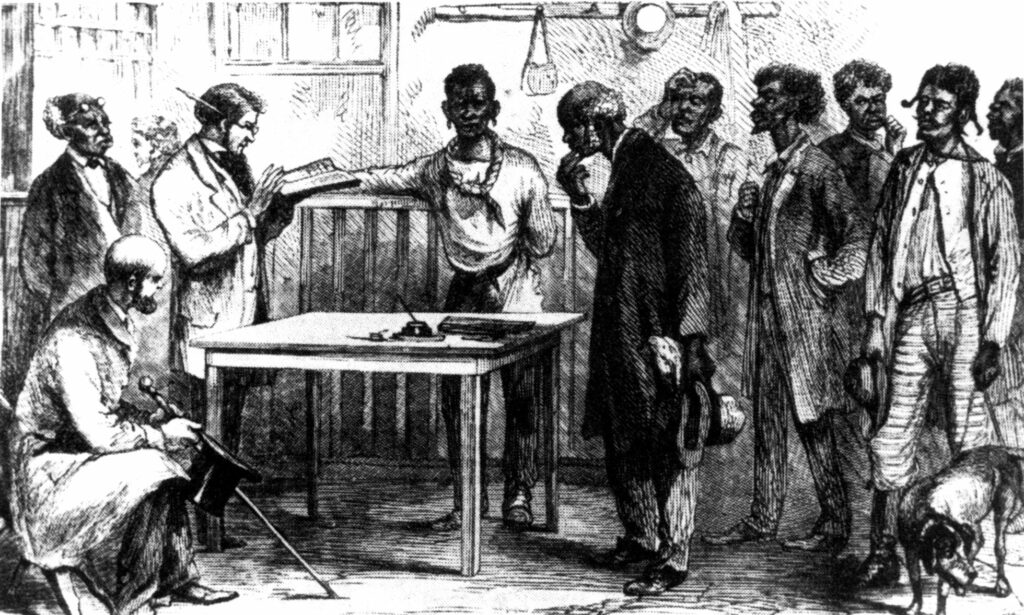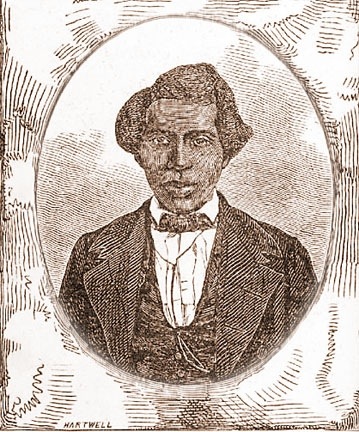Black Speakers of the State House of Representatives During Reconstruction
Black men participated in Georgia politics for the first time during Congressional Reconstruction (1867-76). Betwixt 1867 and 1872 sixty-nine African Americans served as delegates to the constitutional convention (1867-68) or as members of the state legislature. Jefferson Franklin Long, a tailor from Bibb County, sat in the U.Due south. Congress from December 1870 to March 1871. The three most prominent Blackness state legislators were Henry McNeal Turner, Tunis Campbell, and Aaron A. Bradley.

From Harper's Weekly
Turner came to Georgia from Washington, D.C., in 1865 to win Black congregations to the African Methodist Episcopal Church building (AME). He was the virtually successful Black political leader in organizing the Blackness Republican vote and attracted other ministers into politics. He was a delegate to the Georgia constitutional convention of 1867 and was elected to two terms in the Georgia legislature, offset in 1868.
Campbell, a native of New Jersey, was a minister in the African Methodist Episcopal Zion Church. In 1864 he was appointed an agent of the Freedmen's Bureau on the Georgia Body of water Islands. He later moved to the mainland. In 1867 he was elected to the state ramble convention. The next twelvemonth he became a state senator from the 2d Congressional District. He congenital an impressive political machine in and effectually Darien in McIntosh County.

Courtesy of Moorland-Spingarn Research Center, Howard University
Born in South Carolina, Bradley was a shoemaker in Augusta. Old around 1834 he ran abroad to the Due north, where he became a lawyer. In 1865 he returned to Georgia. He was the most outspoken member of the Black delegation to the constitutional convention. In 1868 he was elected country senator from the First District. Despite a checkered past, he rallied plantation workers around Savannah with his insistence that the formery enslaved people be given country.
The church, with the enthusiastic support of Black women, who were still disenfranchised, was the eye of African American political activity. Twenty-four legislators were ministers. However, organized religion, with its emphasis on the other world, predisposed some Blackness politicians to become too conciliatory. Nigh Black delegates to the constitutional convention voted confronting including in the constitution the right of Blacks to concur part. Turner later bitterly regretted that vote.
In September 1868 the legislature, dominated by Republicans, expelled its African American members. Energized, the Blackness legislators, led by Turner, successfully lobbied the federal authorities to reseat them. They connected to concentrate on political and civil rights. For many of them, education had been their highest priority since 1865. With their solid back up, Georgia adopted public education.
Conservatives used terror, intimidation, and the Ku Klux Klan to "redeem" the state. One quarter of the Black legislators were killed, threatened, beaten, or jailed. In the December 1870 elections the Democrats won an overwhelming victory. In 1906 Westward. H. Rogers from McIntosh Canton was the final Black legislator to be elected before Black voters were legally disenfranchised in 1908.
Source: https://www.georgiaencyclopedia.org/articles/history-archaeology/black-legislators-during-reconstruction/
0 Response to "Black Speakers of the State House of Representatives During Reconstruction"
Enregistrer un commentaire